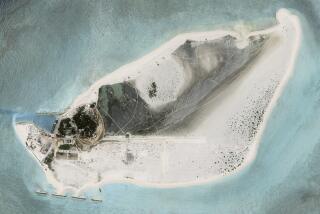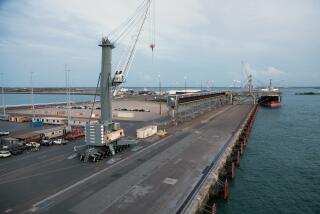Plans for Hong Kong Airport Up in Air
- Share via
HONG KONG — An ambitious plan to build a glittering new airport here in Britain’s last great colony has turned into a battle between Beijing and London for political influence and billions of dollars.
The airport was supposed to be a parting gift.
Now, there are widespread worries that it won’t open by the target date of 1997, when Hong Kong reverts to Chinese rule.
Some fear that it will never be built.
The airport’s expense--$16 billion by conservative estimates--has prompted charges that it will be a cash cow for British companies.
“It’s Britain’s last great present to itself,” said Gordon Wu, a leading Hong Kong businessman with close links to China. “It’s their license to print money.”
These allegations provoke countercharges that China will not back the project unless it gets a substantial slice of the pie.
The controversy highlights fears that the colonial government is a lame duck, that China already calls the shots in the territory.
The first works contract for the airport, a $26-million deal for dredging, went to a Chinese-owned firm.
“Beijing’s main reason for allowing Hong Kong to exist is so the goose can lay golden eggs,” said an American executive involved in the project. “The airport project is definitely a golden egg.”
The latest chapter in the imbroglio concerns funding for a main item in the project, a 4,719-foot suspension bridge that would be the second-longest in the world and connect the airport to Kowloon peninsula, the side of Hong Kong located on the Chinese mainland.
Chinese officials have lashed out at Hong Kong’s decision to fund the bridge from government coffers. The move added further weight to Chinese fears that London is treating the project as its last Asian pork barrel.
Ji Pengfei, the most senior Chinese official in charge of Hong Kong affairs, called the move “unilateral and inappropriate” and warned the Hong Kong government not to try any more “tricks.”
Hong Kong authorities defended the bridge and criticized one pro-Beijing lawyer in the territory for making a “political speech” against the airport.
Hong Kong’s governor, Sir David Wilson, announced the airport plan last October, saying it demonstrated Britain’s commitment to Hong Kong’s future.
The airport plan, one of the biggest engineering projects of the 1990s, includes flattening two hilly islands and connecting them by dumping 260 million cubic yards of rocks and sand into the ocean.
The centerpiece is the new airport on Chep Lap Kok, an island separated from downtown Hong Kong by 16 miles of open sea.
The airport would replace the current one, Kai Tak, on the Kowloon peninsula, famed for its wild landings. Some approaches are so harrowing that passengers feel they are heading for an unwanted kiss with a poster of the Marlboro man on a garage wall.
The new airport would operate 24 hours a day and handle 80 million passengers a year, more than three times the capacity of Kai Tak.
When the airport was announced, Zhou Nan, China’s top representative in Hong Kong, demanded negotiations with the colonial government.
Joseph Y. S. Cheng, a leading educator and political observer in the colony, predicts that problems such as the airport project will multiply in the next seven years.
“China is staking a claim to exert control over Hong Kong not in 1997,” he said, “but now.”
More to Read
Sign up for Essential California
The most important California stories and recommendations in your inbox every morning.
You may occasionally receive promotional content from the Los Angeles Times.













